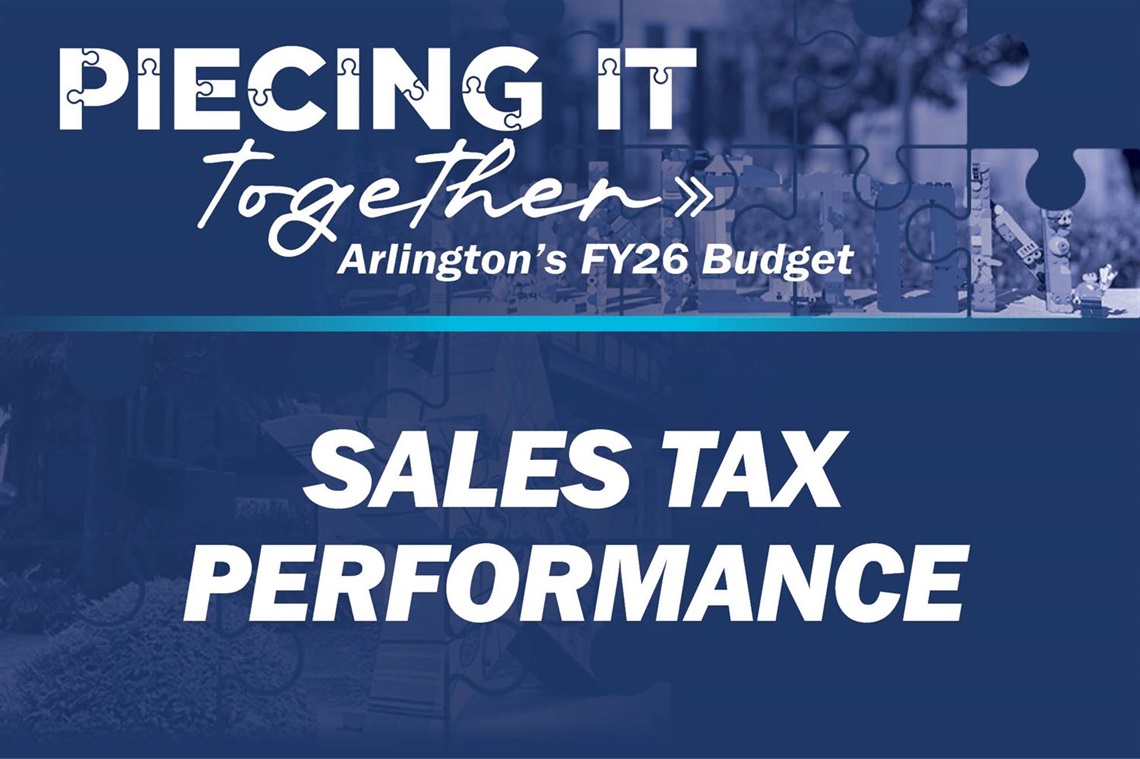Arlington’s Slowing Sales Tax Growth Expected to Continue Next Year
Published on July 24, 2025

The City of Arlington is facing a challenging Fiscal Year 2026. Throughout the next several months, our “Piecing it Together” budget series will provide a high-level overview of the unique situational and economic factors impacting Arlington’s budget this year. Have a question or topic you’d like to see included? Send us a message.
To date, City of Arlington sales tax revenue is about $4 million lower than the Fiscal Year 2025 budgeted amount that was approved by City Council last September. Based on current trends, that shortfall could be as much as $7 million by the time final sales tax data for the fiscal year is available to the City in November.
Arlington had budgeted $97.2 million in sales tax revenue for this year’s General Fund, a conservative increase over FY 2024 sales tax revenue. But for the first time since FY 2009, excluding the pandemic, Arlington’s sales tax collections may not see a year-over-year increase.
Why this matters to you: The $7 million projected drop in sales tax revenue for this fiscal year is coupled with an $11 million decrease in projected property tax revenue. To achieve a balanced budget by the Sept. 30 fiscal year’s end, Arlington has reduced or delayed some planned expenditures in areas designed to minimize impact to city service levels. Because declining sales and property tax revenues trends are expected to continue into 2026, the City Council is evaluating a lengthy list of proposed cost-savings measures and possible reductions in city services for next fiscal year, which starts Oct. 1. Learn more at www.arlingtontx.gov/2026budget.
‘Slower Pace Than the Historical Average’
Arlington is not the only Texas city experiencing slower than expected sales tax growth. According to the Texas Comptroller, tax collections that had soared after the pandemic were still expected to grow from FY25 to FY27, “but at a slower pace than the historical average.” This reflects a “return to more typical economic conditions and the ongoing reaction of consumers and businesses to higher interest rates aimed at easing and controlling inflation,” the Comptroller report states.
From FY09 to FY24, Arlington had seen an average annual 5.3% growth in sales tax collections. Other than the pandemic in FY20, the City has not experienced a year-over-year decline in sales taxes since FY09.
This unexpected change meant that the City’s FY25 sales tax budget, which were part of the adopted budget in September, were too high. For the first seven months of this fiscal year, total sales tax revenue has come in 1.8% lower than the first seven months of FY24.
These challenges are expected to continue into next year. The City is recalculating projected sales tax revenue for FY26, which had initially been projected to top $100 million for the first time in Arlington’s history based on historical growth trends. However, the City is anticipating an year-over-year increase in sales tax collections for FY 2026, in part because of tourism attracted by the new INDYCAR Grand Prix of Arlington and the nine FIFA World Cup games that will also be played here.
The City Council will begin considering the proposed FY26 budget and the property tax rate in August.